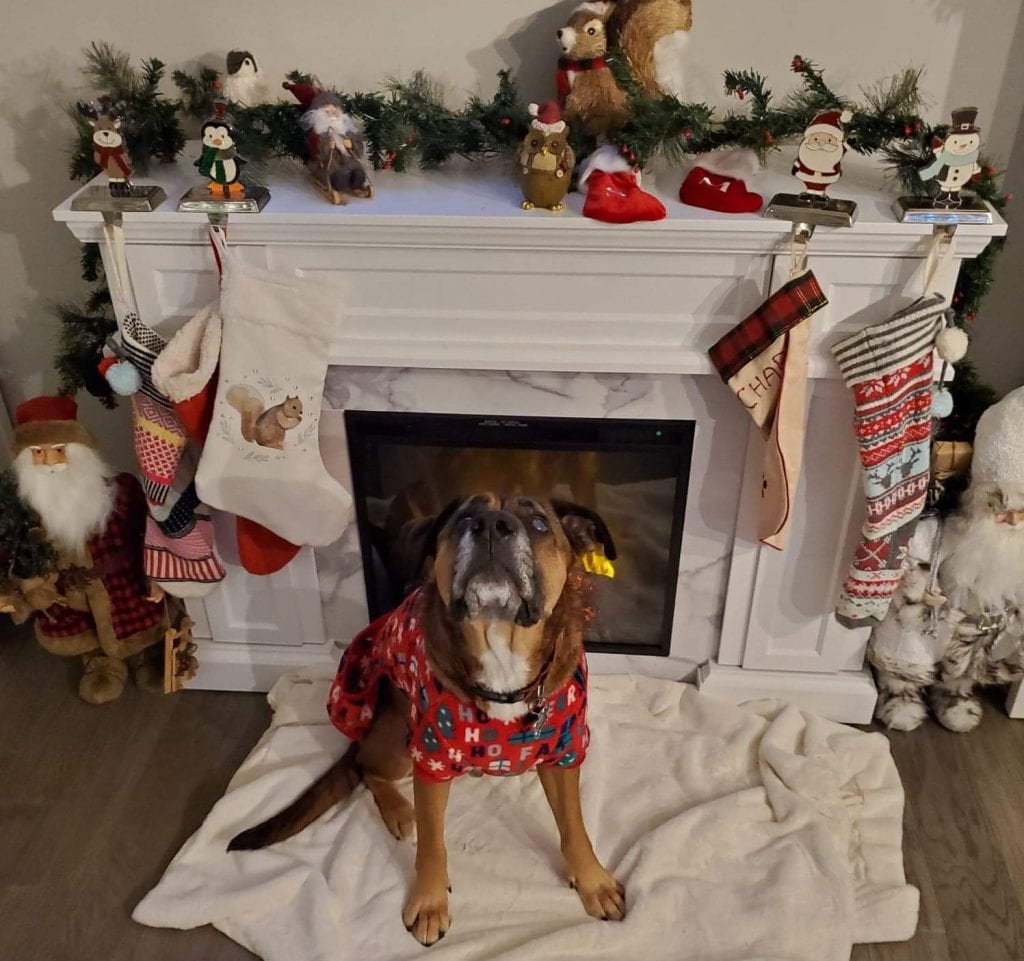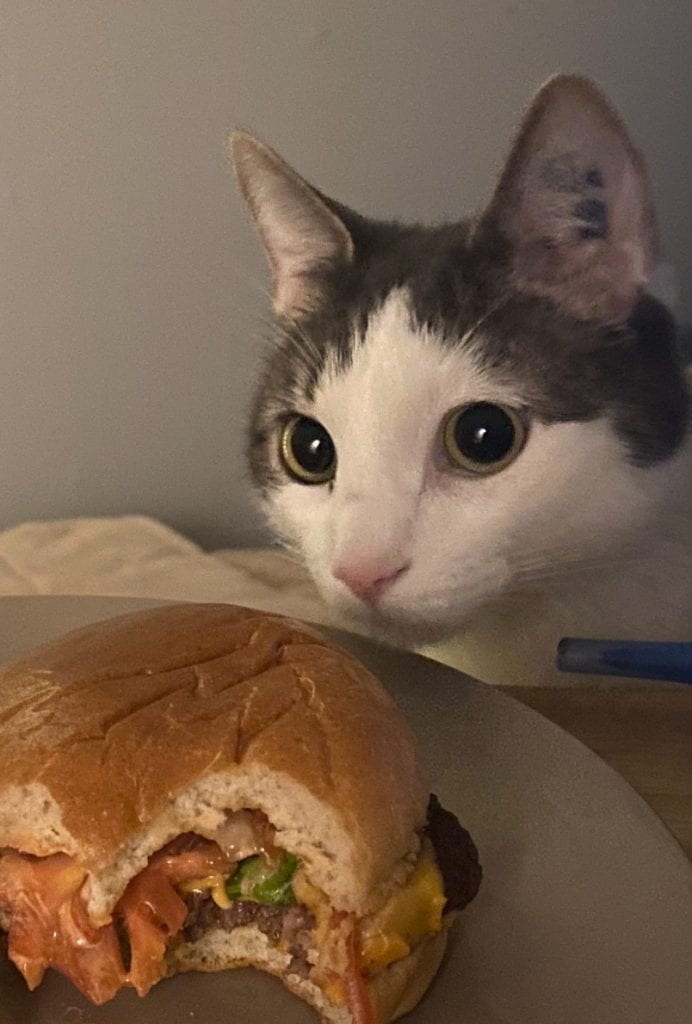It’s the holiday season! This may be a time of year where you get to enjoy your favourite foods and treats, and start to decorate your homes, and maybe include your fur-babies in all the fun! However, it is important to remember that not all human foods are appropriate for our pets. We have a developed a short list of holiday-themed items to avoid giving to your pets over the holidays, and some resources to contact if you are worried that your pet may have consumed something they shouldn’t have.

Foods to Avoid:
1. Chocolate
It is no surprise that chocolate makes it to the list! The darker the chocolate, the more dangerous it is and both cats and dogs are susceptible. Chocolate contains caffeine which can cause rapid breathing, heart palpitations, and muscle tremors. Theobromine is also a component of chocolate that can result in heart problems, muscle tremors, and seizures.
2. Sugarless Candy
Xylitol is the sweetener commonly used in sugarless candies, gums, essential oils, baked goods, mints, etc. In dogs, xylitol is highly toxic and can be quick to act (10-15 minutes), resulting in hypo-glycemia and ultimately, liver failure. While there have not been reported cases in cats, it is better to be safe than sorry!
3. Bread dough
The main component in dough for breads to look out for is yeast. Yeast in raw dough can still rise after ingestion and lead to gastrointestinal upset, intestinal ruptures or obstructions, or can cause a gastric-dilation volvulus. Signs to look for are vomiting, weakness, distended stomach, and increased heart rate. Furthermore, the fermentation of yeast produces carbon dioxide and alcohol. Alcohol is then absorbed leading to alcohol poisoning. If you suspect your pet has consumed uncooked dough while baking bread for your Christmas dinner, seek immediate attention.
4. Festive Drinks (and Alcohol)
Cocktails, specialty coffees, and tea are fun festive drinks during the holiday season! However, it’s important to keep these out of reach of our fur babies. Alcohol poisoning in your pets can result in low blood sugar, blood pressure, and body temperature. You may identify alcohol poisoning in your pets by a staggered, clumsy movements, confused behaviours, and vomiting. In cats, alcohol can end in severe liver and brain damage. It may also be important to remember that fun drink additions and garnishes, such as chocolates and candies, can be detrimental to your pets. Alcohol may also be a component in holiday sauces and is commonly used in baked goods. Ingredients in festive drinks ie chocolate and candy garnishes, etc, as described above, are risks for toxicity as well. Also keep in mind sauces with alcohol, baked goods soaked in rum or hard liquor, etc.
5. Grapes, raisins, and currants
While these foods are commonly consumed throughout the year, these are prime ingredients in delicious holiday treats such as fruit cakes. In dogs, these fruits can cause serious kidney damage. While less severe reactions are reported in cats, it is still important to avoid ingestion in cats.
6. Uncooked meat or Meat scraps
While cooking up some delicious holiday meals, remember to keep uncooked meats in the fridge/freezer, or covered if it must be out. Furthermore, scraps of food may contain bones. Bones are extremely dangerous for our pets as they have sharp edges and can splinter, resulting in tooth fractures and damaging the lining of the intestinal tract. Uncooked or high fat meats can cause abdominal pain and vomiting which may be indicative of pancreatitis. Uncooked meat can also be a host to bacteria such as Salmonella and E. Coli.

Decorations and Other Winter Items
7. Tinsel
Tinsel is fun, sparkly, and catches the eyes of cats! It’s easy to get a hold of and oh so fun to play with, but if ingested can lead to obstructed digestive tract, severe vomiting, dehydration and may require surgery. If you have a kitty at home, it may be best to opt for other decoration options.
8. Holly berries and mistletoe
While holly berries and mistletoe are beautiful decorations for your home during the holidays, they can be a problem for your pets. Holly can cause nausea, vomiting, and diarrhea. Upon ingestion, you might find your pet drooling or shaking their head. Mistletoe can cause mild signs of gastrointestinal irritation. However, large quantities of ingestion can cause hypotension, staggered movements, seizures, and ultimately, death. Also, a reminder that lilies are extremely toxic to cats. Remember to keep these kinds of decorations out of reach of your pets.
9. Poinsettias
The white sap in poinsettias contain diterpenoid euphorbol esters and saponin-like detergents that can cause vomiting, drooling, and diarrhea in both cats and dogs if ingested. There are some issues with skin exposure as well which can result in skin irritation, redness, and swelling.
Other Things to Consider
10. Food wrappings
Aluminum foil, plastic wrap, and wax paper are commonly used to wrap our holiday leftovers in. They may also seem like a great idea to let your pet lick some leftovers from for a holiday treat. However, if these food wrappings are ingested, they can cause intestinal obstructions. Remember to wrap your leftovers and put them in the fridge/freezer as soon as possible to keep them out of reach of your pets. Also, opt to provide pet-friendly treats to your pets in their clean pet food bowls (Check out our previous blog post “Before You Fill the Bowl” for more information).
11. Ice melts
Ice melts commonly contain forms of sodium and are used in the winter months on walkways, driveways, and other areas to avoid slippery surfaces. Small amounts of ice melts could cause stomach upset if ingested and result in electrolyte imbalances in your pets. There is also potential for skin and paw pad irritation with frequent exposure to ice melt walkways.
12. Hot Food
While cooking, hot foods might fall out of the pan and pets can be quick to grab a bite while they can! However, ingesting food that is too hot can cause burns inside your pet’s mouth. When carrying hot food to the dinner table, be sure to avoid tripping over your fur babies as hot food can burn the skin if dropped, just like humans!
13. Overeating Human Foods
And lastly, eating foods in moderation is important for both you and your pets! Too many treats and food can cause stomach pain, diarrhea, and potentially pancreatitis in your pets. Consistently consuming human foods and treats can also lead to overeating and may eventually result in obesity over time. Human food and treats are not considered complete or balanced and should not exceed 10 % of your pets’ daily calories. To avoid over consumption of “human-foods” in your pets, it could be a great idea to refer to our previous blog post “Tricky Treats” to learn more about appropriate treats and how to give them.
The holidays are a fun time for both you and your pet! While this list is not complete, it can be a helpful guide to avoid certain foods in your home to keep your pets safe. Here are also some resources in case of emergency:
- Pet Poison Helpline: 855-764-7661 | www.petpoisonhelpline.com
A 24-hour animal poison control center available in the US, Canada, and Caribbean
- Animal Poison Control Center: 888-426-4435 | www.aspca.org
- Your Local Veterinarian
For more information check out these resources:
5. The Canadian Veterinary Medical Association, animalhealthcare.ca
6. Your pet’s veterinarian!
Written by Hannah Godfrey, BScH, MSc Candidate
Edited by Dr. Adronie Verbrugghe, DVM, PhD, EBVS Specialist in Veterinary and Comparative Nutrition® (Dip ECVCN)


